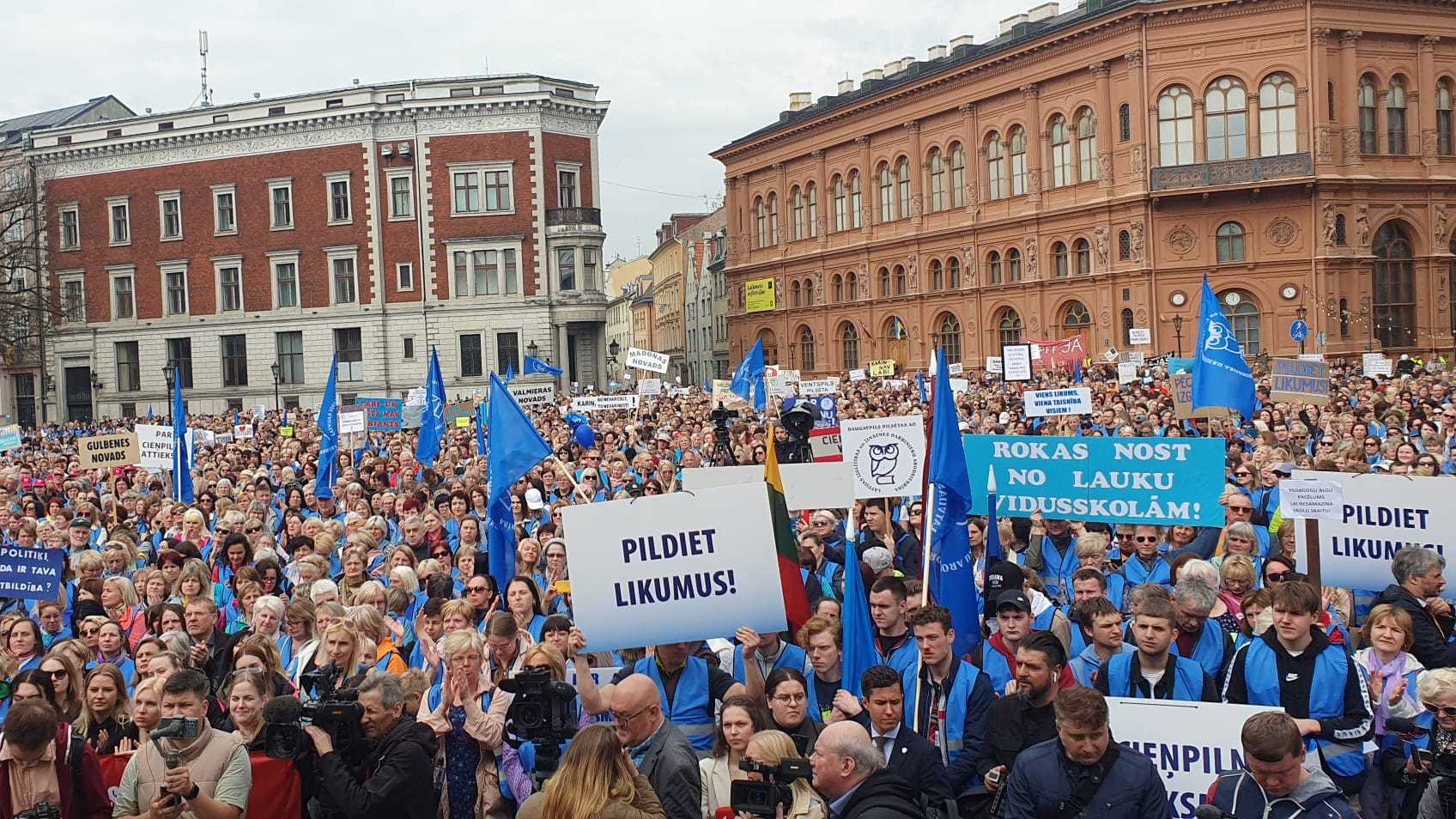An intense three-day strike by educators in Latvia, led by the Latvian Education and Science Workers’ Trade Union (LIZDA), forced the coalition government headed by Krisjanis Karins to increase their wages. LIZDA organized a major protest march in the Latvian capital of Riga on April 24 and went on a three-day strike until April 27.
Subsequently, in a meeting with the union leadership on April 25, government authorities in principle agreed to increase teachers’ pay, with additional funding of EUR 4.168 million (USD 4.59 million). On April 26, an emergency meeting of the cabinet approved the agreement for additional funds for the wage hike.
Even though the teachers resumed work on April 27, LIZDA leadership has stated that they will review the situation in May by considering the status of the allocation of funds to local authorities to raise wages. Based on that assessment, they will decide on whether to continue protests.
Against the backdrop of the ongoing war in Ukraine, energy prices have soared across Europe, including in Latvia where annual inflation stood at 17.26% in March 2023. At the peak of the crisis during the last year, the Latvian working class were in deep distress.
Meanwhile, the Latvian government was at the forefront of helping NATO’s war effort in Ukraine and supporting Ukraine’s bid for NATO membership. Amidst the soaring inflation crisis and social and economic distress, the Latvian government enthusiastically provided Ukraine with financial aid, arms, and ammunition, including air defense systems. and helped in the training of Ukrainian army recruits.
Meanwhile, the teachers union LIZDA called for an indefinite strike of school teachers covering 23,000 education workers of about 800 institutions from September 19 2022, protesting overwork and a fall in real wages. The strike was averted when the government agreed to a last-minute deal on September 16, and the teachers were offered some relaxation in workload and more funds to increase wages. As per the deal, from September 1, 2023, teachers will switch to a 36-hour work week and an increase in the lowest salary from EUR 900 (USD 991.98) to EUR 1,080 euros (USD 1190) per month. An increase in the salary rate for preschool teachers from EUR 970 (USD 1069.13) to EUR 1,070 (USD 1179.25), from January 2023, and an overall increase of 11% in funding for the education of professional vocations in the 2023 budget was also assured.
In March of this year, the Latvian parliament approved the 2023 budget which earmarked “an amount equivalent to 2.25% of GDP on defense in 2023, with that figure set to rise to 2.4% in 2024 and 2.5% in 2025 as part of a longer budgetary framework included with the legislation.” A significant amount of money was also earmarked to support Ukraine. Even though the Latvian government has earmarked EUR 61.6 million euros (USD 67.89 million) to increase teachers’ wages, the teacher’s union was worried that the “Budget Framework for 2023, 2024, and 2025 did not include a schedule for the increase in the remuneration of teachers for the time period from 2023 September 1 to 2025 December 31 in order to ensure the necessary financing.”
In the wake of an impending strike threat by the teachers, earlier in March, Latvian Prime Minister Krisjanis Karins even tried to intimidate the working class by stating that an increase in wages of teachers may lead to cuts in other sectors like health pensions, as strikes won’t generate additional income.
To quell the protests from LIZDA, on April 18 the government approved the timeline of the expected salary increase proposed by the Ministry of Education and Science (IZM), which stipulated that from September 1, 2023, the lowest hourly rate will be EUR 8.50 (USD 9.37) for educators, excluding pre-primary education teachers, from September 1, 2023. The rate is expected to be EUR 9.54 (USD 10.51) on January 1, 2024 and EUR 10.35 (USD 11.41) on January 1, 2025.
But LIZDA has decided to move forward with the strike, as there is no clarity over the balancing of workload and working hours, since the proposed increase in wages is proportional to the working hours. The union has launched a petition calling for the resignation of the government, as it violated the agreement made with the teachers.
According to a statement issued by LIZDA on April 27, “the government has agreed to commence the balancing of workload for all groups of teachers from September 1, 2023, and in May 2023, LIZDA will organize a meeting with education authorities in order to gain confidence that the funding is sufficient for both the salary schedule and workload balancing.”
In the meeting with the authorities on April 25, LIZDA also called for a proportional increase in the higher wages of the teachers, along with the lower wages.
There have been reports which suggested that, as threatened by the prime minister earlier, in order to finance wage increases for teachers, the government is likely to increase education costs by 3.38% per student.
Earlier, the Socialist Party of Latvia (LSP) expressed solidarity with the protesting teachers and issued a statement in which they said that the teachers across Latvia are outraged by another government deception to raise wages and equalize the workload, and the struggle of Latvian teachers for survival in the conditions of the “success story” created by each government in the country’s economy continues to this day.
“Our party fully supports the fair and persistent struggle of teachers and all workers in the educational sphere of the country. But at the same time, as before, we propose not to limit ourselves to knocking out another ‘favor’ from the government for a separate category of workers in Latvia,” the party added. “The time has come to raise the question of the political bankruptcy of the current government and the revision of the political course of the country as a whole.”





